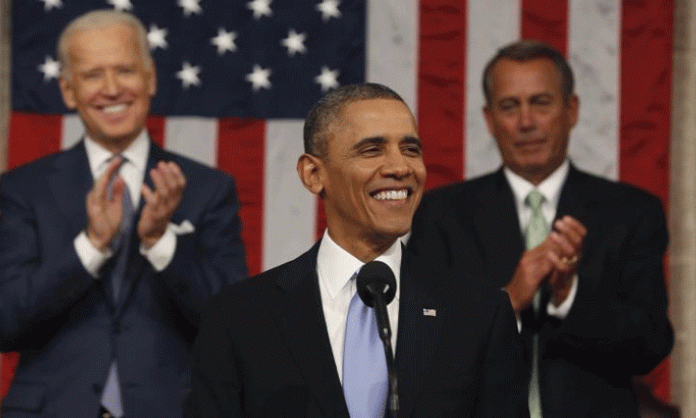President Obama’s 31 January State of the Union address highlighted growing inequality in the US. In it he also pledged to take steps to reduce greenhouse gases in the atmosphere. What has the Obama administration done recently on both counts?
Less aid
It agreed to a new budget that won’t renew entitlements for the long term unemployed. This will immediately impoverish 1.3 million workers. The new budget restored some social spending previously cut under the bipartisan “sequester” agreement of last year. But many of those cuts remain.
A new bipartisan farm bill continues massive subsidies to big agriculture, while cutting food aid (known as “food stamps”) for the poorest section of the working class by nearly $9 billion. This comes on top of the $5 billion sequester cut to the program, which was not restored in the new budget.
These cuts to already inadequate food aid will hit 1.7 million people, many of them children. Especially hard hit will be Blacks and Latinos.
One is Raymond Garza, who became disabled a few years ago. On 29 January he had to go to a church charity in Oakland, California, near where I live, for a free bag of food.
His food stamp ration of $176 a month had just run out. “Every day I’m struggling to eat. I got my food stamps on the 10th [of January]. Today’s the 29th. I got another 10 days before I can go buy some food again.”
Before the sequester cuts, his food stamp allotment was $206 a month. Now it will be cut even below $176, which is less than $6 a day for a 30-day month – about enough for one cup of coffee and a pastry at Starbucks.
The new cut was reached in a “compromise” between Republicans who wanted to cut $39 billion, and Democrats who wanted to cut “only” $4-5 billion.
This shows how politics works in the US today. Republicans make outrageous proposals to impoverish workers, Democrats look good by proposing to impoverish them less, and then they “compromise”.
There is now a movement to raise the minimum wage, which at the federal level is just $7.25. It has two aspects. On one hand, there have been strikes and demonstrations at Walmart and fast food outlets. On the other, there have been demonstrations and ballot measures at city and state levels to raise the minimum wage by law. Some Democrats have supported such efforts, but not all, and the Republicans are opposed.
It’s not only the capitalists in the low-wage sector who resist raising the minimum wage, but the owning class as a whole, since raising the minimum wage will have the effect of raising all wages.
Growing inequality between the capitalists and wage workers and other producers has accelerated over the last six years. But it has been developing over decades, under both Democratic and Republican administrations.
More gas and oil
Obama’s program to reduce carbon emissions came in the form of boasting that US production of natural gas and oil has reached new levels, and will continue to expand – that’s bad news for the environment.
But it means that the US has a leg up on its imperialist competitors. Energy costs for industry in the US are 50 percent of those in Europe.
The imperatives of capitalist competition inexorably drive to increase fossil fuel production and weaken environmental regulations. Already there is talk in the European Union of cutting back its regulations.
Multibillionaire Warren Buffet, who sometimes tells the truth, said back in 2006, “There’s a class war, all right, but it’s my class, the rich class, that’s making war, and we’re winning.”
How can the situation be turned around? The editors of the left wing journal Monthly Review answered that question in January’s issue. “The only possible answer to capital’s unlimited decades-long assault on labor”, they wrote, “is to unleash a class struggle from below in response.
“But economic resistance alone is never sufficient; and all the less so in those cases where workers are economically hemmed in as at present.
“The revolt of the underlying population … must take the form of a general political offensive against what is an unequal and irrational system. If the future of humanity and that of capitalism can be said to have coincided at one time, this is certainly no longer the case today.
“All reality and all hope demand a new system of production and consumption, beyond capital and beyond mere wage labor.”










